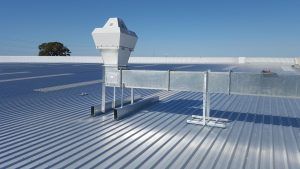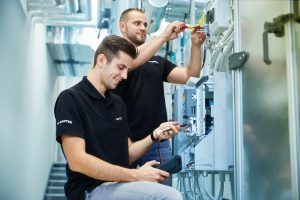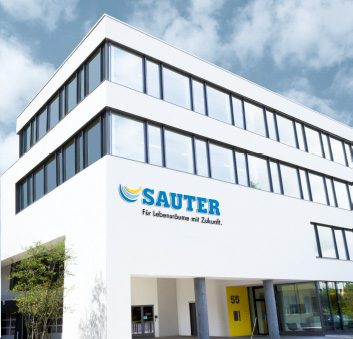Why the correct operation of ventilation systems is particularly important now
Why the correct operation of ventilation systems is particularly important now
Ventilation systems can contain the spread of viruses, because the higher the air exchange rate, the fewer viruses are in the room air. SAUTER offers solutions for new installations and modernisation projects.
Preparation for the cold season
There are two airborne vectors of infection: close contact transmission via large droplets, and via what are known as aerosols. Numerous studies and outbreak patterns worldwide have shown that aerosols play an important part in coronavirus (COVID-19, SARS-CoV-2) transmission. According to the Robert Koch Institute (RKI), the findings so far indicate that SARS-CoV-2 is unlikely to be spread via ventilation systems in operation. However, unventilated rooms, unfiltered air circulation systems, and cool ambient temperatures such as those in slaughterhouses present ideal conditions for the spread of the coronavirus.
This means correct operation of ventilation systems with at least the minimum outdoor air flow rates is crucial, especially when the weather turns colder. The more air is exchanged, the fewer viruses are present in the room air. All ventilation systems achieve a dilution effect by exchanging the air in the room, thus reducing the potential number of viruses per cubic metre. In principle, this reduces the risk of infection. The dilution is considerably improved and the viral load further reduced with systems that supply treated outside air and remove polluted room air.
Commercial air conditioning
Building technology ‒ an investment in health
You are in safe hands with SAUTER building automation solutions. Take time to think about your building technology and have the system checked and adjusted by our expert service staff. If you don’t have an automated ventilation system or if your existing one is getting old, our staff will be happy to advise and support you. Investment or modernisation can ensure hygienic air and protect the health of your employees, customers, and the general public. From small and medium to large ventilation and air conditioning systems: SAUTER has the right control system for every application.
Our components and expertise in clean-room technology also ensure the very highest level of safety at the Robert Koch Institute (RKI) for its research into dangerous viruses.
Recommendations for the operation of buildings
As early as 17 March 2020, REHVA, the umbrella organisation of the European HVAC associations, published a preliminary guide on operating and using building technology to prevent the spread of the coronavirus at the workplace.[1] This guide is continuously updated and is based on the best evidence and knowledge that is currently available. It includes valuable recommendations such as avoiding central ambient air circulation during SARS-CoV-2 outbreaks. Recirculation dampers should be closed (via the building management system or manually). This may cause problems with cooling or heating performance, but this must be accepted because it is more important to prevent contamination and protect public health. Normal filters in air recirculation devices are often not sufficient for effectively filtering out viruses.
Where air recirculation is indispensable, BTGA, Germany’s industrial association for technical building services, recommends the following: “Particularly in rooms with a high cooling requirement, as is the case in slaughterhouses, the systems must be equipped with high-quality filters such as HEPA filters to ensure proper hygienic operation.” It is generally recommended to adapt the operating times of mechanical ventilation systems to the situation. Ventilation should start at nominal speed at least two hours before use and reduced to a lower speed two hours after use. The general advice is to supply as much outdoor air as reasonably possible. In buildings without mechanical active ventilation systems it is recommended to use manually operated windows (much more often than usual, even if this causes some thermal discomfort).
Humidification and air conditioning have no practical effect, nor do duct cleaning or premature replacement of fresh air filters. Modern ventilation systems are equipped with fine fresh air filters directly behind the fresh air intake, which filter the particles from the outside air and thus provide adequate protection against contaminated outside air. However, maintenance personnel should be adequately protected with gloves and respiratory protection when changing the external filters. But room air cleaning units with electrostatic filtration or UV cleaning units can kill viruses and are suitable solutions for certain applications.
In summary, the following practical measures are recommended for the operation of building technology:[2]
- Safe ventilation of rooms with outside air
- Switch the ventilation to nominal speed at least two hours before the building is used and to a lower speed two hours after the building is no longer used
- Do not turn off the ventilation at night or weekends, but let the systems run at a lower speed
- Ensure regular ventilation by opening windows (also in actively ventilated buildings)
- Keep toilet ventilation in operation at all times
- Avoid open windows in the toilets to ensure the correct direction of ventilation
- Flush toilets with the lid closed
- Switch ventilation units with circulating air to 100% outside air
- Inspect heat recovery systems to make sure there are no leaks
- Either switch off fan coil units or work in such a way that the fans are constantly on
- Do not change heating, cooling and any humidification setpoints
- Do not schedule air pipe cleaning for the current period
- Replace central outside air and exhaust air filters as usual according to the maintenance schedule
- Regular filter changes and maintenance work must be carried out with the usual protective measures, including respiratory protection
Author: Dipl.-Ing. Claudia Mayer, Product Manager, SAUTER Germany
[1] The REHVA guide is based on the best currently available studies and knowledge, but in many respects the information on coronavirus (SARS-CoV-2) is still limited or non-existent, so previous knowledge on SARS-CoV-1 has been used for the best practice recommendations. Therefore, the REHVA recommendations are precisely that, and are not of a binding nature. For more information and the option to download the guide in the original version (English), visit www.rehva.eu.
[2] The Bundesverband Technischer Gebäudeausrüstung e.V. (BTGA) also provides important recommendations in its information issued on 24 April 2020 (German):
- Operating air conditioning systems in the conditions of the current Covid-19 pandemic
- Press release from BTGA e.V.
About SAUTER
As the leading provider of solutions for building automation technology in Green Buildings, SAUTER ensures good climate conditions and a sense of well-being in sustainable environments. SAUTER is a specialist in developing, producing and marketing products and systems for energy-efficient total solutions, and offers a comprehensive range of services to ensure the energy-optimised operation of buildings. Our products, solutions and services enable high energy efficiency throughout the entire life-cycle of a building – from planning and construction through to operation – in office and administrative buildings, research and educational facilities, hospitals, industrial buildings and laboratories, airports, leisure facilities, hotels and data centres. With over 100 years’ experience and a track record of technological expertise, SAUTER is a proven system integrator that stands for continuous innovation and Swiss quality. SAUTER provides users and operators with an overview of energy flows and consumption, and therefore of the development of the costs involved.
The SAUTER Group
- Company active worldwide with headquarters in Basel, Switzerland
- Founded in 1910, it is built on more than 100 years of tradition and experience
- With more than 2,300 employees, it is present and active globally
- Complete building management solutions from a single source
Focus: maximum energy efficiency and sustainability - Investment protection and operational reliability over the entire building life-cycle
- Technology leader in the building automation and system integration sector
- Member of eu.bac, BACnet Interest Group (BIG-EU), BACnet International, EnOcean Alliance
- Excellent references available at sauter-controls.com



